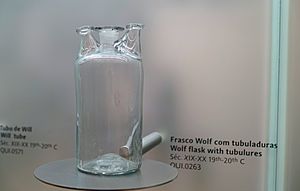Peter Woulfe facts for kids
Quick facts for kids
Peter Woulfe
|
|
|---|---|
 |
|
| Born | 1727 Tiermaclane, Ennis, County Clare, Ireland
|
| Died | 1803 |
| Nationality | Irish |
| Awards | Copley Medal (1768) |
| Scientific career | |
| Fields | Chemistry mineralogist |
Peter Woulfe (born 1727, died 1803) was an interesting Anglo-Irish scientist. He was both a chemist and a mineralogist. This means he studied chemicals and minerals (like rocks and ores). Peter Woulfe is famous for inventing a special piece of lab equipment called the Woulfe Bottle. He also had some very unique ideas about chemistry, even believing in alchemy!
Contents
Who Was Peter Woulfe?
Peter Woulfe was born in Ireland in 1727. He became a well-known chemist and mineralogist. A mineralogist is someone who studies minerals. He was one of the first people to think that a mineral called wolframite might contain a new element. This element was later discovered and named tungsten.
Peter Woulfe's Discoveries
Peter Woulfe made some important observations in chemistry. In 1771, he was working with indigo, a blue dye. He noticed that when he treated indigo with nitric acid, it turned into a yellow dye.
The Yellow Dye Discovery
Later, other scientists realized that Woulfe had accidentally created picric acid. This acid became very useful! It was the first man-made dye. It was also used as an explosive and even as a special treatment for burns.
The Woulfe Bottle
Around 1767, Peter Woulfe invented a clever piece of lab equipment. It is called the Woulfe Bottle. This bottle has two or three necks. Scientists use it to clean or dissolve gases. It was a very helpful invention for chemistry experiments.
Alchemy and Mystery
Peter Woulfe was not just a scientist. Some people described him as an alchemist and a mystic. Alchemy was an old practice that mixed chemistry with magic and philosophy. Alchemists often tried to turn common metals into gold. They also searched for a special "Elixir of Life" to live forever.
Woulfe believed in alchemy. He tried to find the "Elixir." He thought his failures were because he had not done enough good deeds. It is said that some of his old lab equipment still exists. On this equipment, there are prayers for success. There are also wishes for the well-being of other alchemists.
 | William L. Dawson |
 | W. E. B. Du Bois |
 | Harry Belafonte |

